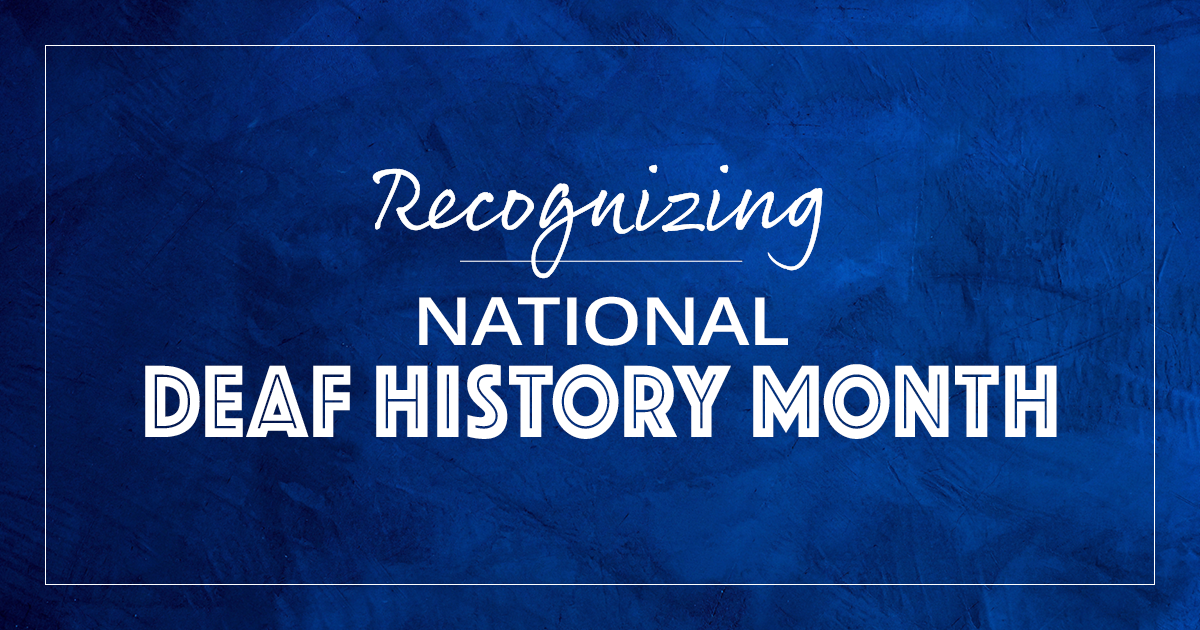Asking for Accommodations During a Job Search
 In recognition of National Deaf History Month, we are spotlighting Matt, one of our Ticket to Work Success Stories. For a long time, Matt’s hearing loss and other medical issues interfered with employment. But he was eager to move beyond the limitations of relying on his Social Security disability benefits. "I always wanted and planned to work," he says, "…to be productive, build a career, and earn more money …." So how did he do it?
In recognition of National Deaf History Month, we are spotlighting Matt, one of our Ticket to Work Success Stories. For a long time, Matt’s hearing loss and other medical issues interfered with employment. But he was eager to move beyond the limitations of relying on his Social Security disability benefits. "I always wanted and planned to work," he says, "…to be productive, build a career, and earn more money …." So how did he do it?
As a job seeker who is deaf and needed accommodations in the workplace, Matt was uncertain about his prospects for employment. At first, he was reluctant to ask for anything from a prospective employer. He wondered whether employers would hire him if they knew he needed job accommodations. Before we describe Matt’s journey, let’s talk about accommodations.
According to the Job Accommodation Network, there are more than 28 million Americans who are deaf or hard of hearing.
What’s an Accommodation?
Reasonable accommodations are changes to a job, work environment, work schedule or any other adjustment that makes it possible for an employee with a disability to perform a job for which they are qualified. For example, Matt's primary means of communication is by keyboard. Using email is the best way for him to share thoughts and ideas with coworkers. In addition, Matt can read lips so one-on-one meetings are more productive than large group sessions. In large group settings, Matt needs an interpreter to facilitate his participation.
The Americans with Disabilities Act of 1990 (ADA) requires employers to provide reasonable accommodations to qualified employees and applicants with disabilities, unless such accommodations would pose an undue hardship to the employer (e.g. too costly, too extensive, too substantial, too disruptive). In general, the applicant or employee with a disability is responsible for letting the employer know that they need an accommodation to participate in the application process, to perform essential job functions, or to receive equal benefits and the privileges of employment
Asking for Accommodations During a Job Search
Did you know that accommodations can help you even before you've been hired? You are also legally entitled to adjustments to the interview or application process. But taking the initiative to request accommodations can be anxiety-inducing for many people. Here are some tips for you to consider about requesting reasonable accommodations from a prospective employer:
- Consider your timing. Knowing when to disclose your disability and ask for accommodations is a highly personal decision. Some people want to let recruiters know before an initial screening, especially if they need accommodations to successfully participate in the screening or in a later interview. Others prefer to wait longer to disclose. For example, some people wait to disclose until they receive the job offer. Finally, others decide to wait to see if they can perform the job first without an accommodation. It is up to you.
- Ask questions about the hiring process. You need to know what to expect so that you can make an informed decision about when or whether to disclose your disability and what kind of accommodation to ask for.
- Be specific about your needs. It's up to you to be direct and explicit about what you require to perform a job optimally.
- Frame your request positively. Demonstrate that you're engaged and solution oriented by conveying your interest in the position, emphasizing your desire to do your best throughout the hiring process and in the position and finally, by requesting one or more specific accommodations.
- Know before you begin the hiring process how much information about your disability you want to share. You don't need to provide great detail. Share only what is relevant to your success on the job.

What did Matt do?
Together, Matt and his counselor from Community Integrated Services (CIS), a Pennsylvania-based Ticket to Work Employment Network (EN), identified the accommodations that he needed to perform well in an office environment and to demonstrate his abilities during an application process. They agreed on an approach for disclosing his disability and requesting accommodations that made him comfortable.
By the end of 2014, Matt was offered part-time work at a nonprofit organization that provides direct support to people with developmental disabilities. He served in a variety of capacities as an administrative assistant and the experience bolstered his collaborative problem-solving skills. Of equal importance was the growth in his self-confidence. It felt good to contribute.
Matt had good relationships at work, but soon needed more responsibility than the job could offer. His connection to the staff at CIS had grown strong throughout the year that they had worked together. They appreciated his skills and personal attributes. Matt knew they could provide the accommodations and work environment he needed. When he expressed a desire for full-time work, CIS offered him full-time work as a Human Resources Assistant, and he was delighted.
Matt's work gives him the fulfillment and stability to continue building the future he envisions. In 2019, he purchased a home, an achievement that seemed remote four years earlier.
If you're working with a Ticket to Work service provider, like an EN or State Vocational Rehabilitation (VR) agency, they can help you brainstorm how to request accommodations. They can guide you through the process of discussing and disclosing your disability with an employer and may suggest accommodations that can help you succeed at work.
To learn more about the Ticket to Work Program, you can call the Ticket to Work Help Line at 1-866-968-7842 or 1-866-833-2967 (TTY) Monday through Friday, 8 a.m. to 8 p.m. ET. A representative can answer questions and send you a list of service providers. Or you can use the Find Help tool to search for service providers on your own. The filters can help you find a service provider that provides the services you want, and you can search specifically for a service provider with experience working with people who are deaf or hard of hearing.